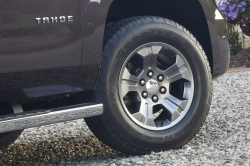
— General Motors hard brake pedals have caused a lawsuit that alleges customers have brake booster problems that cause the replacements of the boosters and master cylinders.
The proposed GM brake failure class-action lawsuit includes all former and current owners and lessees of the following vehicles:
- 2015-2016 Cadillac Escalade
- 2014-2016 Chevrolet Silverado 1500
- 2015-2016 Chevrolet Suburban
- 2015-2106 Chevrolet Tahoe
- 2014-2016 GMC Sierra 1500
- 2015-2016 GMC Yukon
The lawsuit alleges GM's strategy is to engage in deception upon customers, while even technical service bulletins allegedly contain false and deceptive information about fixing the defects because the repairs do not fix the vehicles and the statements are designed to mislead dealers and vehicle owners.
Complaints about the alleged problem cover all kinds of issues that GM allegedly must have known about, including the need for increased effort to depress brake pedals, high occurrences in stop-and-go traffic and high occurrences of failures at lower speeds.
According to the lawsuit, GM issued a series of service bulletins to dealers regarding the brake problems, with the latest bulletin dated March 15, 2017.
Plaintiff John Harris says he purchased a new 2015 Chevrolet Suburban in December 2014, but in early January of 2017, Harris and his wife noticed the brakes on the Suburban were allegedly not functioning properly.
The brakes would seemingly function without problems the first three to four times when they were applied or tapped, but thereafter the brakes would become hard and resist depression, or require an increased effort to depress the brake pedal but with no stopping ability.
Harris contacted the dealership from which he purchased the Suburban and informed the dealer of the braking failure issue.
The dealership was allegedly familiar with the problem because in February 2015, GM had issued a technical service bulletin (TSB) #PIT5361B that said a customer may complain about a hard brake pedal or that increased effort is needed to depress the brake pedal.
"While performing normal diagnostics, fluid may be found in the brake booster and/or the booster vacuum line.”
In January 2017, the dealership picked up the SUV for repairs based on a technical service bulletin. About four days later the Chevy Suburban was delivered to the plaintiff, allegedly repaired of the brake problems.
On February 28, the plaintiff’s wife was driving the Suburban when the identical hard brake problem occurred and the brakes allegedly failed and caused the SUV to hit another vehicle.
On the same day, the plaintiff says he notified the dealership of the brake failure and the crash and told the dealership of his apprehension of ever operating the SUV again. Harris also says he made a demand that GM should be responsible for the vehicle.
On March 13, the plaintiff’s wife was contacted by a representative of General Motors who requested GM be allowed to inspect the SUV and indicated that no work was to be performed on the vehicle. GM’s inspection of the SUV occurred on or about March 14 at an auto repair facility in Texarkana, Texas, and lasted all day.
In April 2017, Harris contacted the dealership and informed them that GM was doing nothing to resolve the issue of the wrecked vehicle and resulting lack of transportation for his family due to brake failure. Multiple representatives from the dealership allegedly attempted to make contact with GM but were unsuccessful.
On May 2, GM allegedly contacted the dealership and instructed it to obtain the SUV and repair the brakes according to the TSB, but the dealership personnel said they had previously performed the repairs according to the bulletin in February 2017. The dealership decided GM should send a field engineer to come and inspect the Suburban’s brakes.
GM allegedly informed the dealership that it had already sent a field engineer to inspect the brakes and had already determined the brakes failed during the inspection. The dealership allegedly informed GM they would not perform any additional warranty repairs on the Suburban.
Around May 2, 2017, and allegedly without his knowledge, Harris learned that GM had directed that the Suburban be sent to a second dealership to perform the brake repairs. Those repairs were purportedly performed pursuant to the service bulletin.
The plaintiff says the first dealership notified GM on May 4 in writing through legal counsel that it would refrain from from performing any further repairs to plaintiff’s vehicle. The dealership allegedly further demanded that General Motors "expeditiously resolve Plaintiff’s problems with the Suburban."
On June 15, 2017, GM allegedly denied the claims and sent a warning message to the plaintiff:
“Please note that you have an obligation and responsibility to ensure that the subject vehicle and its related components are maintained and preserved in their immediate post-incident condition for as long as there is intent to pursue a claim and/or cause of action.”
The lawsuit alleges GM sent this warning even though the automaker had already inspected the Suburban and found the brakes to be defective and knew the SUV had subsequently been repaired again by the second dealership.
In June, the plaintiff allegedly attempted to back the Suburban and a boat trailer on a boat ramp to launch his boat but the brakes failed again. Trying to keep the SUV from sinking into the water, the plaintiff says he repeatedly pumped on the brake pedal and the vehicle finally stopped.
The lawsuit makes it obvious this alleged brake failure occurred even after GM had repaired the SUV a second time.
According to Harris, the Suburban sits at his home, unusable and without value.
The lawsuit was filed in the U.S. District Court for the Eastern District of Texas, Texarkana Division - John J. Harris, et. al., v. General Motors Company.
The plaintiff is represented by Cory Watson, P.C., and Wyly-Rommel, PLLC.




